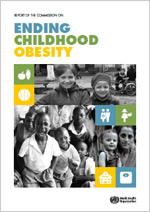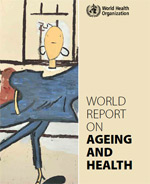WHO releases reports on Childhood Obesity and also on Ageing
Ending Childhood Obesity report

The Commission on Ending Childhood Obesity (ECHO) presented its final report to the WHO Director-General on 25 January 2016, culminating a two-year process to address the alarming levels of childhood obesity and overweight globally. The ECHO report proposes a range of recommendations for governments aimed at reversing the rising trend of children aged under 5 years becoming overweight and obese.
The Ending Childhood Obesity report highlights that:
"Primary health-care services are important for the early detection and management of obesity and its associated complications, such as diabetes. Regular growth monitoring at the primary health-care facility or at school provides an opportunity to identify children at risk of developing obesity. Low-energy diets can be effective in the short term for the management of obesity, but reducing inactivity and increasing physical activity will increase the effectiveness of interventions. There is little written on models of health service delivery for the provision of obesity treatment in children and adolescents, but it is clear that these efforts can only be effective with the involvement of the whole family or care environment."
Link to report
World report on Ageing and Health

The WHO’s World report on Ageing and Health published in September 2015 outlines that Comprehensive public health action on population ageing is urgently needed. The report states that in order to achieve this we will require fundamental shifts, not just in the things we do, but in how we think about ageing itself. It offers a framework for action to foster Healthy Ageing built around the new concept of functional ability. The report suggests that these investments will have valuable social and economic returns, both in terms of health and wellbeing of older people and in enabling their on-going participation in society.
The report highlights:
""Older people often identify a preference for growing old in their own homes or at least within the communities where they live. This allows them to maintain the relationships and community networks that can foster well-being and act as resources in times of adversity. Although the focus of ageing in place has frequently been on ensuring appropriate and affordable housing and age-friendly built environments, as well as providing instrumental support, health services also have an important role to play by providing care that reaches people where they live. Thus, models of care will need to be reoriented towards prioritizing primary care and community-based care. This encompasses a shift from inpatient care to ambulatory and outpatient care, to more homebased interventions, community engagement and a fully integrated referral system."
Link to report